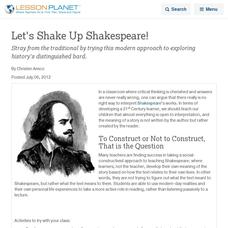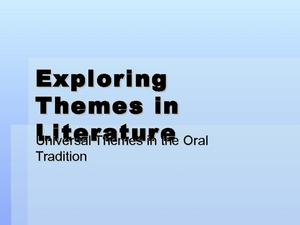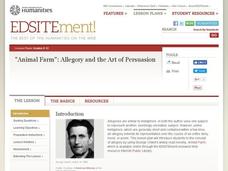Loudoun County Public Schools
Figurative Language Packet
A definitive resource for your figurative language unit includes several worksheets and activities to reinforce writing skills. It addresses poetic elements such as simile and metaphor, personification, hyperbole, and idioms, and...
Ereading Worksheets
Figurative Language for Edgar Allen Poe
Are your classes weary of dreary worksheets? Are the learners nearly napping? Thrill them, fill them with delight with an interactive worksheet that asks them to identify the figurative language Edgar Allen Poe uses to add horror and...
Novelinks
Oedipus the King: Biopoem
The biopoem is a great way for instructors to get to know class members, classmates to get to know each other, and readers to flesh out their understanding of a character. Why not create a biopoem for a character from Oedipus the King?
Curated OER
The Pearl: Found Poem
It's hard to beat the beauty of John Steinbeck's prose, so borrow a little of it to form your own found poetry. After kids finish Chapter One of The Pearl, they select the most evocative and vivid words to create found poems.
Curated OER
The Metamorphosis: Herber Readiness Activity
Delve into Franz Kafka's The Metamorphosis before opening the book with a lesson on literary themes. High schoolers engage in a word association activity before reading a list of statements based on the book's themes. Then, in groups,...
Novelinks
The Winter’s Tale: Shakespeare’s Words
Varier wag? I'fecks? Posterns? As part of their vocabulary study, readers of The Winter's Tale try their hand at crafting Shakespearian-style sentences using words drawn from the play.
Curated OER
Let's Shake Up Shakespeare!
Stray from the traditional by trying this modern approach to exploring history's distinguished bard.
Curated OER
Exploring Themes in Literature: The Oral Tradition
Are you are considering a unit on Beowulf or Superman, on myths, or tricksters? Here's a great overview you can use to launch a study of universal themes and archetypes. The focus here is on the oral tradition, but the concepts apply to...
National Endowment for the Humanities
Faulkner's As I Lay Dying: Burying Addie's Voice
High schoolers explore the use of voice and title in William Faulkner's, "As I Lay Dying". They identify and discuss the use of image, symbols and narrative voice in the story.
Curated OER
"World enough, and time"-Andrew Marvell's Coy Mistress
Discuss tone and imagery with Andrew Marvell's "To His Coy Mistress." In an attempt to get his fair lady to consummate their relationship, he write a poem urging her to seize the day! Introduce the author to your high school class,...
Curated OER
American Life
In this American Life activity and progress test worksheet, students respond to a total of 23 short answer, true/false, multiple choice, matching, crossword puzzle, and fill in the blank questions pertaining to American Life.
Curated OER
A Victorian Vocabulary Challenge
Introduce your high schoolers to some tough vocabulary. No, I'm not talking about the SAT list! Revisit Victorian literature to find tricky words we still use today. Using the Visual Thesaurus, learners will preview vocabulary in a quote...
Curated OER
"Shooting an Elephant"
Study selected vocabulary terms in George Orwell's "Shooting an Elephant." A chart includes five selections, and learners must record the connotative and denotative meaning for each. A great look at using the context to define vocabulary...
National Endowment for the Humanities
In Emily Dickinson's Own Words: Letters and Poems
Analyze the depth and beauty of American Literature by reading Emily Dickinson's letters and poems. The class analyzes Dickinson's poetic style and discusses Thomas Wentworth Higginson's editorial relationship with Dickinson. They pay...
National Endowment for the Humanities
Walt Whitman to Langston Hughes: Poems for a Democracy
Explore the idea of democratic poetry. Upper graders read Walt Whitman, examining daguerreotypes, and compare Whitman to Langston Hughes. They describe aspects of Whitman's I Hear America Singing to Langston Hughes' Let America Be...
Southern Nevada Regional Professional Development Program
Close Reading in the Classroom
Close reading is key to the analysis and interpretation of literature. A close reading of the title and the epigraph of “The Love Song of J. Alfred Prufrock” offers readers an opportunity to examine how even single words or names can...
Southern Nevada Regional Professional Development Program
Reading Literature - The Ruin
Cross-comparison, the technique of focusing on two different texts with the same themes, motifs, events, etc., is employed in an exercise that asks groups to examine two different translations of “The Ruin,” a poem, written in Old...
Indiana University
World Literature: "One Evening in the Rainy Season" Shi Zhecun
Did you know that modern Chinese literature “grew from the psychoanalytical theory of Sigmund Freud”? Designed for a world literature class, seniors are introduced to “One Evening in the Rainy Season,” Shi Zhecun’s stream of...
Curated OER
Literary Analysis: Summary vs. Analysis
What is the difference between summary writing and literary analysis? A 16-slide presentation offers some basic requirements for both types of writing and helps readers identify each based on keywords used in both types of writing....
Curated OER
Hiroshima: Question Answer Response Strategy (QAR)
“The crux of the matter is whether total war in its present form is justifiable. . .” After reading “The Aftermath,” the final chapter of Hiroshima, class members use a Question Answer Response (QAR) strategy to reflect on issues raised...
Curated OER
Ordinary People: Cubing Strategy
Readers of Ordinary People employ a cubing strategy based on Bloom’s Taxonomy to analyze, from multiple perspectives, an excerpt from Chapter 10 of Judith Guest’s novel. The excerpt, a rationale and complete directions for the activity...
Curated OER
What Are the Advantages and Disadvantages of Conforming?
Dive into Arthur Miller’s The Crucible and determine what it means to conform in society, and discuss as a group with the thoughts and plans available in these documents. Included are multiple activities and brain targets that form the...
Shakespeare Uncovered
Merely Players
“. . . one man in his time plays many parts,/His acts being seven ages.” Jaques famous speech from Act II, scene vii of As you Like It sets the stage for an examination of the roles people play. Class members not only consider the roles...
National Endowment for the Humanities
Animal Farm: Allegory and the Art of Persuasion
Introduce your class members to allegory and propaganda with a series of activities designed to accompany a study of George Orwell's Animal Farm. Readers examine the text as an allegory, consider the parallels to collective farms and the...
Other popular searches
- Descriptive Phrases
- Prepositional Phrases
- Appositive Phrases
- Adverb Phrases
- Adjective Phrases
- Transition Phrases
- Phrases and Clauses
- Verb Phrases
- Gerund Phrases
- Transition Words and Phrases
- Foreign Phrases
- Adverbial Phrases

























